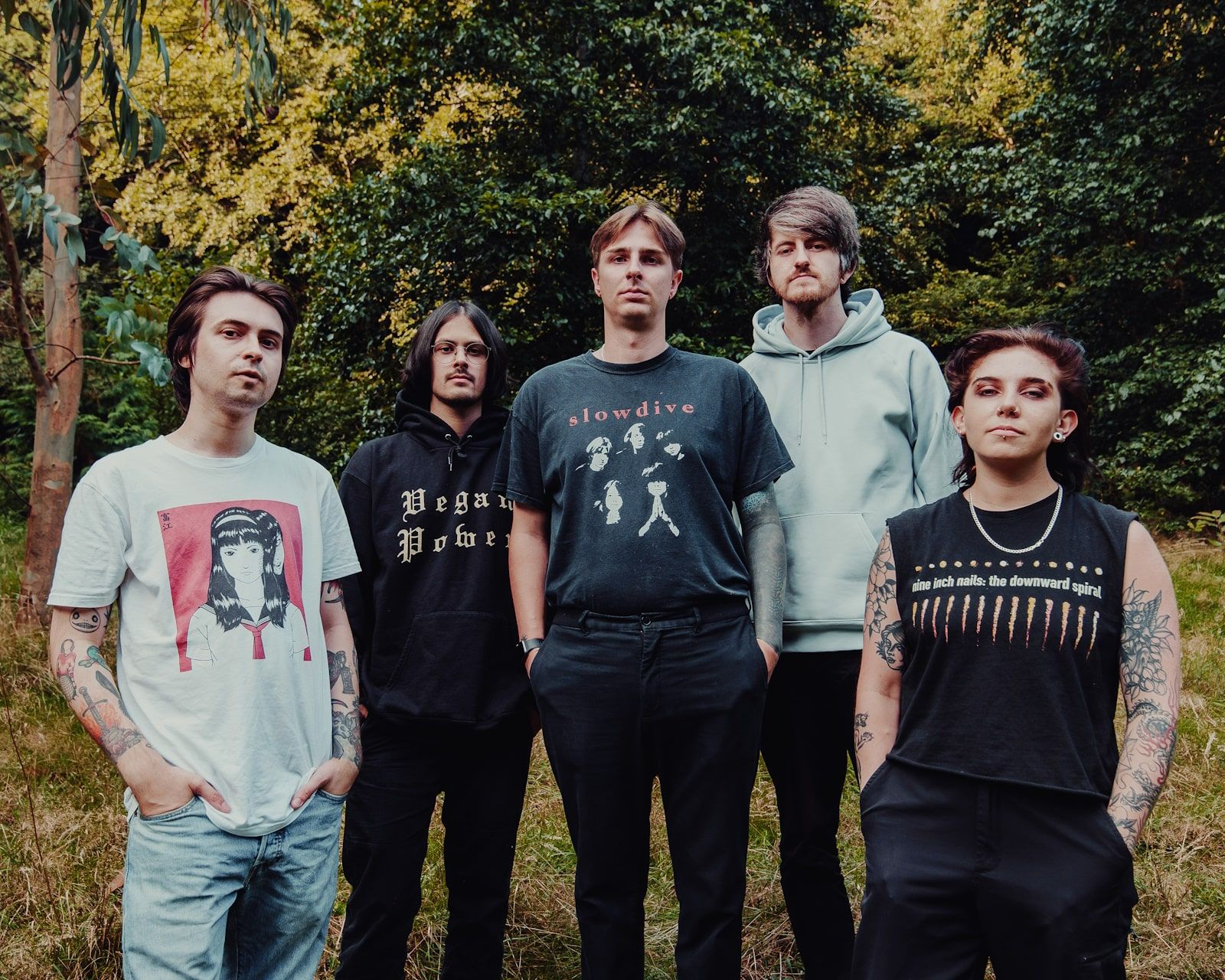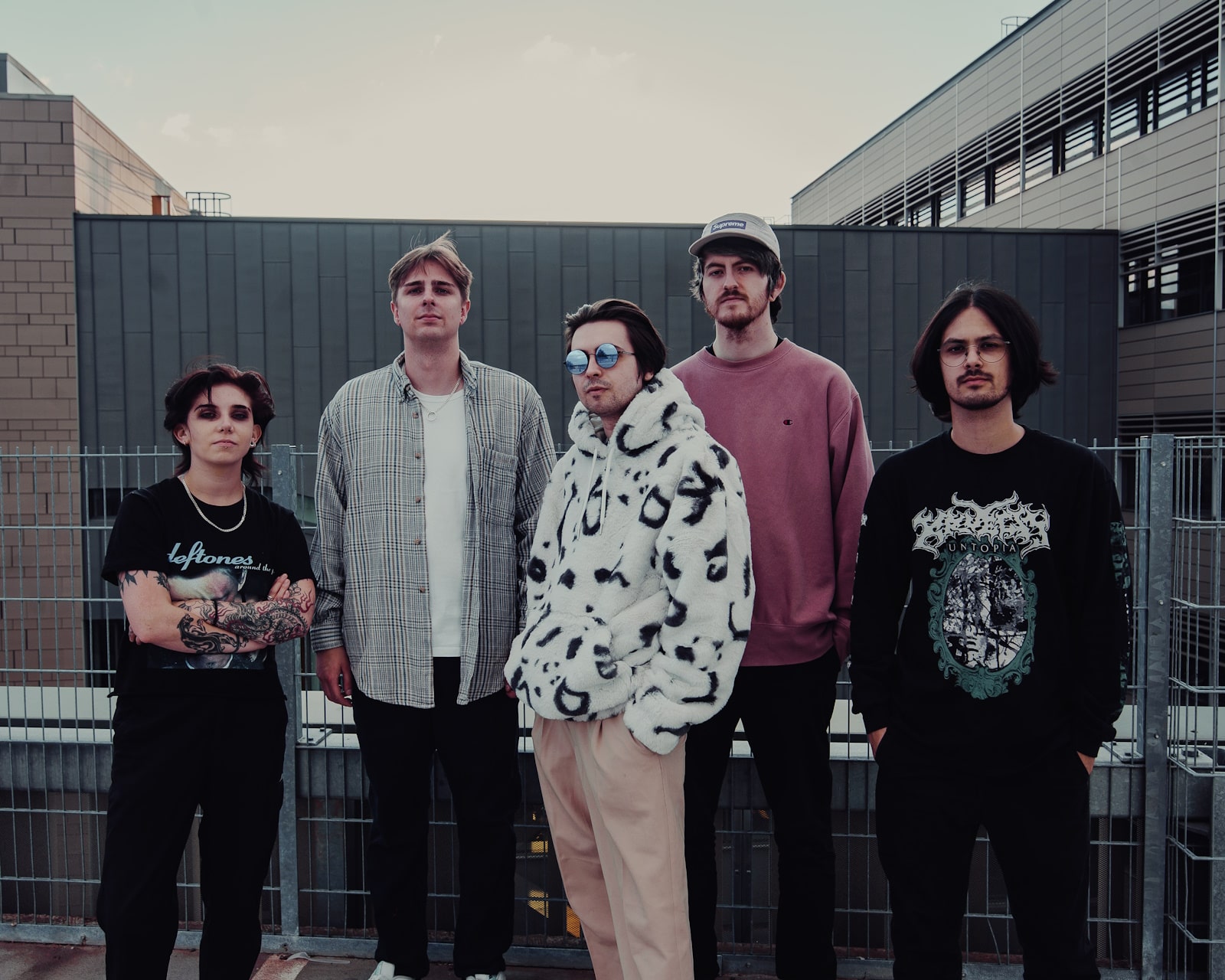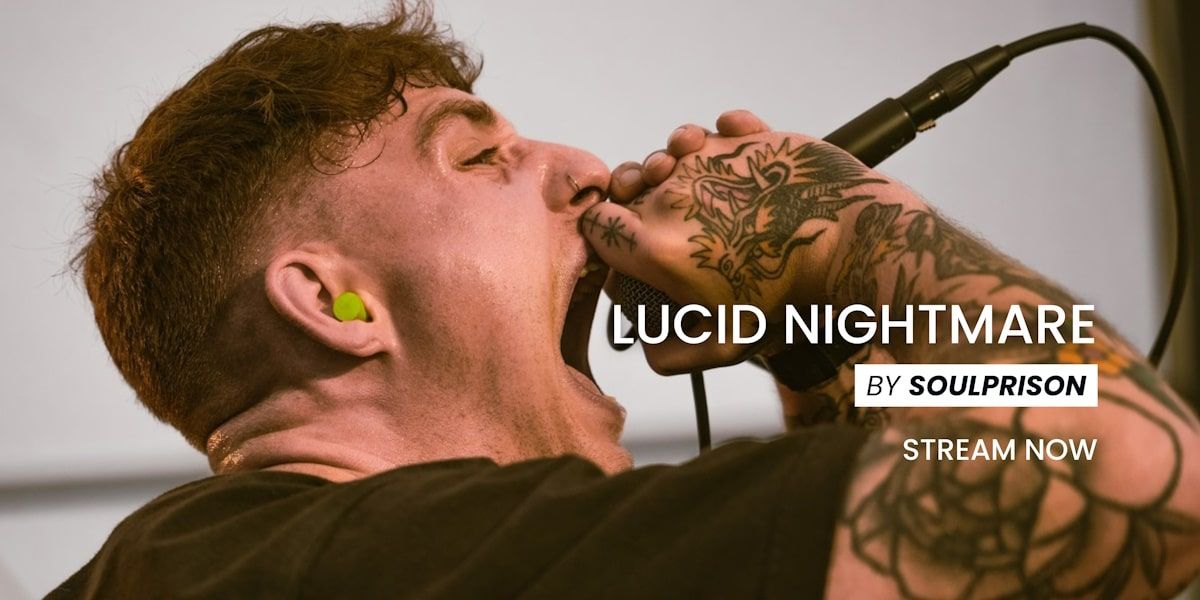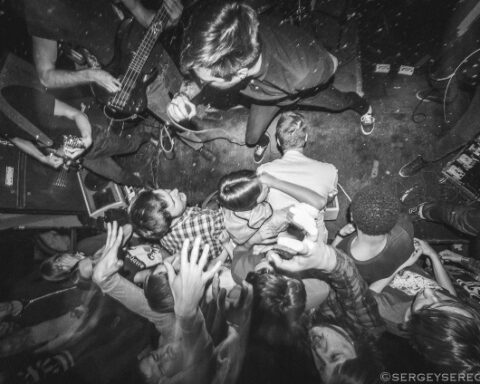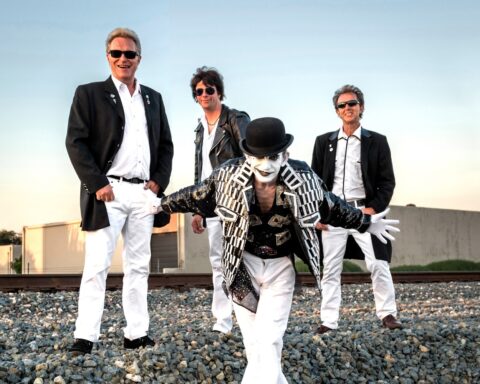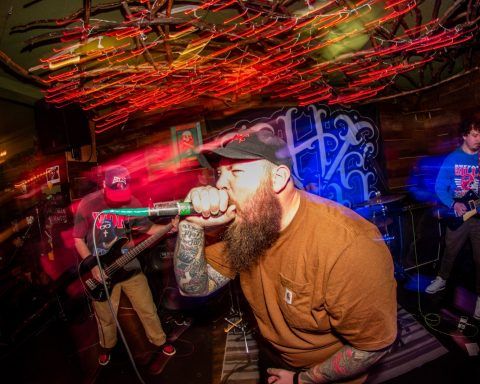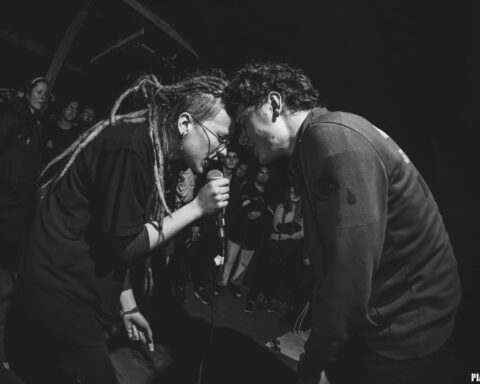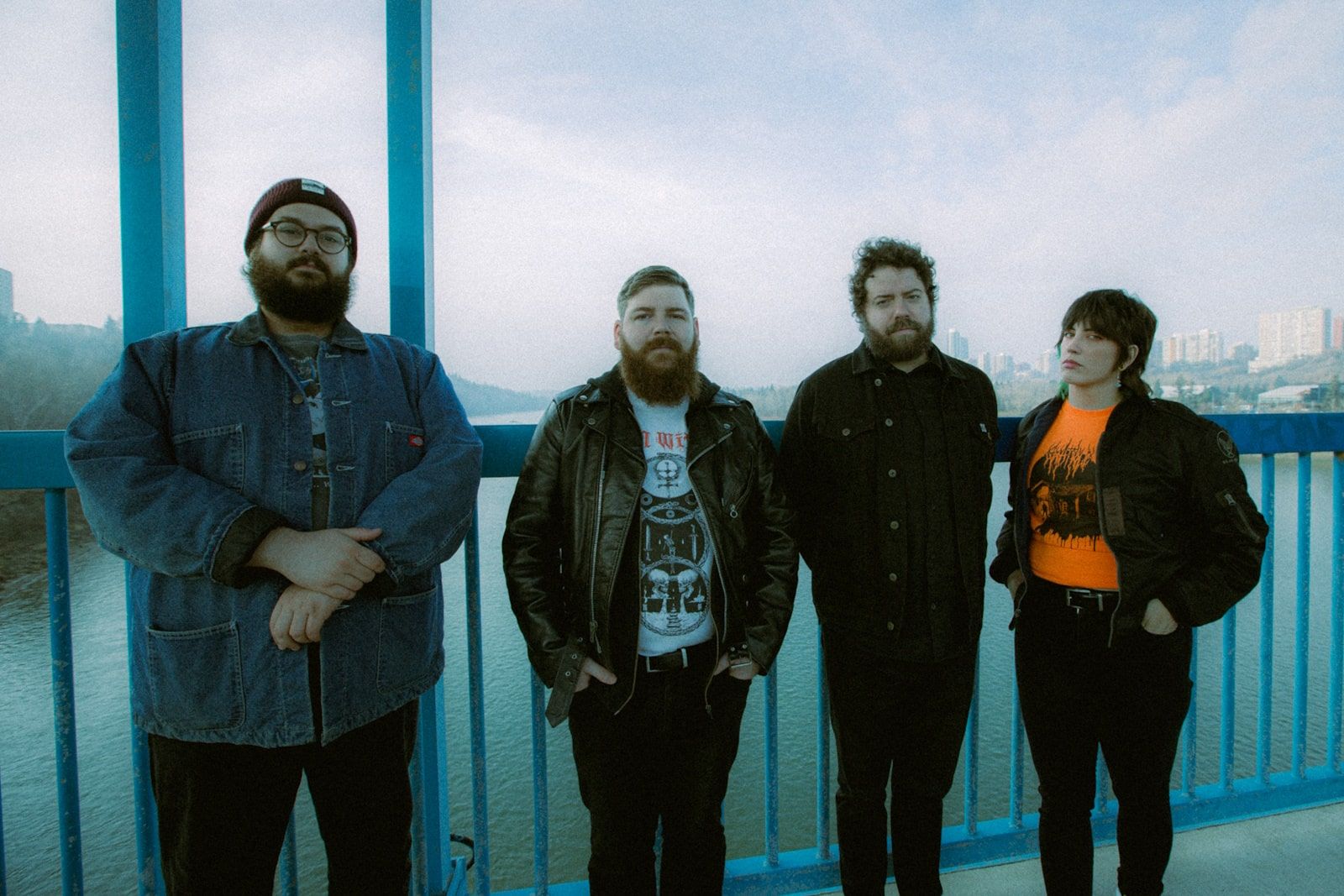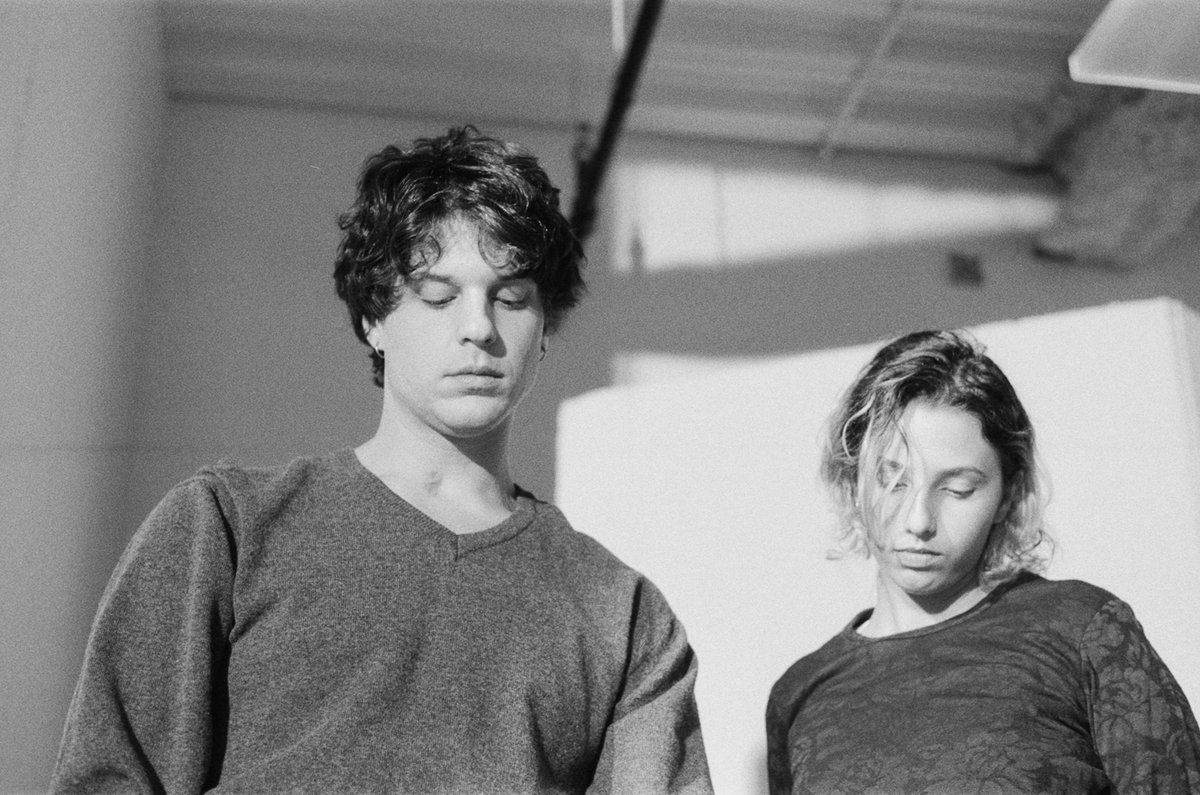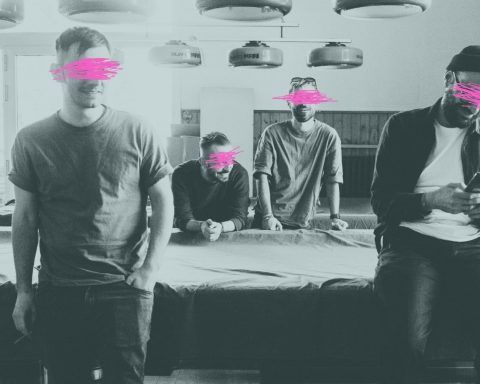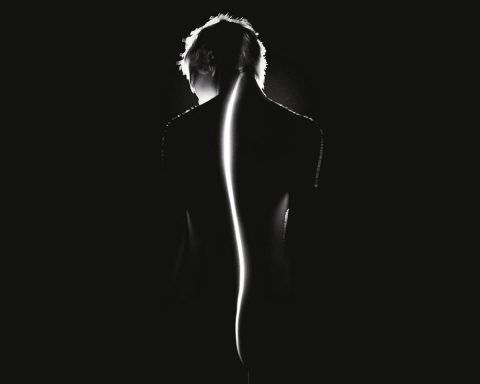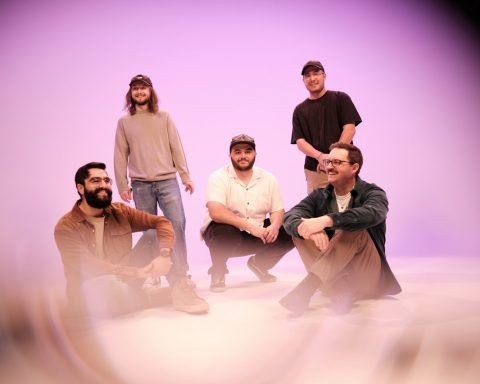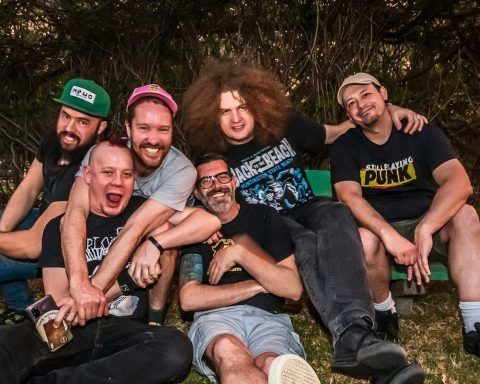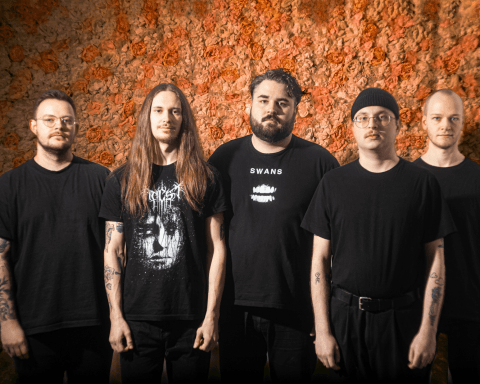Birmingham’s own CAULDRON are igniting the metalcore scene with a fresh ferocity, channeling the grit of their city into a sound that’s both unyielding and evocative. As the quintet released the video for their single ‘I Forgot You Existed (Seattle 1)’, there was a palpable tension in their music, a grappling with problems underestimated and a world wearied by repeat offenses. It’s this grappling that vocalist Frazer Cassling captures with a newfound melodic clarity, challenging himself to blend the raw with the catchy, the aggressive with the harmonious.
The setting for their latest video stands as an unintended metaphor for the themes CAULDRON wrestles with: the transient, the overlooked, the spaces that incubate culture just before they’re razed to the ground. This poignant accident parallels the band’s own stance on spaces—like the Litten Tree building—that foster community and art, spaces that are essential to the cultivation of their sound and scene, yet are under threat.
As they balance melodic hooks with hardcore heaviness, CAULDRON is conscious of their roots, of the sound that has been building since their inception.
This authenticity is palpable in their approach to songwriting—organic, driven by the energy of live play, and unafraid of rawness.
In an exclusive interview, CAULDRON delves into the emotional resonance behind ‘I Forgot You Existed’, the importance of their physical roots in a digitizing world, and the personal tribulations that bleed into their narrative-driven album.
Vocalist Frazer Cassling’s experiences, particularly with OCD, inform the fabric of the record, offering a brutally honest yet story-rich exploration of mental health.
The band’s journey from concept to creation, from intimate shows to impending tours, and from physical media to digital streams, encapsulates a yearning for authenticity in an ephemeral world.
CAULDRON’s full interview follows below, providing an unvarnished look at their creative process, their evolution as artists, and their hopes for the impact ‘Suicide In The City’ has on listeners and the metalcore landscape.
Frazer, your vocal approach on ‘I Forgot You Existed (Seattle 1)’ shows a stark vulnerability, yet it carries a cathartic power. Could you walk us through the emotional and creative process that led to the birth of this track?
Frazer: The idea of the title ‘I Forgot You Existed’ initially referred to my own mental health issues resurfacing.
It was during a time where I’d felt okay for a period but then majorly relapsed and it was almost like I’d forgotten entirely everything I’d learned during recovery. Lyrically, the pattern on this album is that I would take something I was going through personally and channel it through a character, this time it was the character of Grace who had forgotten about her demons. The song is almost a plead with your own mental health not to punish you for underestimating it.
This was the first song me and Zak wrote entirely with Dec who joined on guitar just after we’d started writing the record. Dec brought ideas to the table that I never would have thought of, such as chord patterns that I can’t even play myself. We wanted this song to feel desperate and feel hopeless but in a way that was also very melodic and moving.
The video for your new single has a very raw and somewhat nostalgic feel, being set in an old pub with plans to be demolished. Is there a metaphorical connection between the location and the themes of the song or the album?
No that’s actually completely accidental, we actually only just learnt that they’re tearing it down. The idea for the video was to have us playing in a very derelict nondescript looking room whilst we all slowly fall apart during its runtime. The fact that it’s being demolished is a very unhappy accident as the place is awesome.
The Litten Tree building’s current use as a hub for DIY hardcore shows and an art space seems very grassroots. How important is the concept of space and place in the cultivation of your music and community?
Frazer: Extremely important. We’d not been to the Litten Tree prior to filming there but we were put on to the place from a couple of the local hardcore dudes, and we’ve since been back there to attend some of the shows. The place makes an awesome venue for hardcore and it’s a massive shame we’re losing it.
It reminds me of the venues we tend to play in Germany where it’s usually a community spot that’s been adopted by the punk and hardcore scene, and those are always favourite places to play because they’re so different to what we tend to get over here. It’s a real shame it’s going.
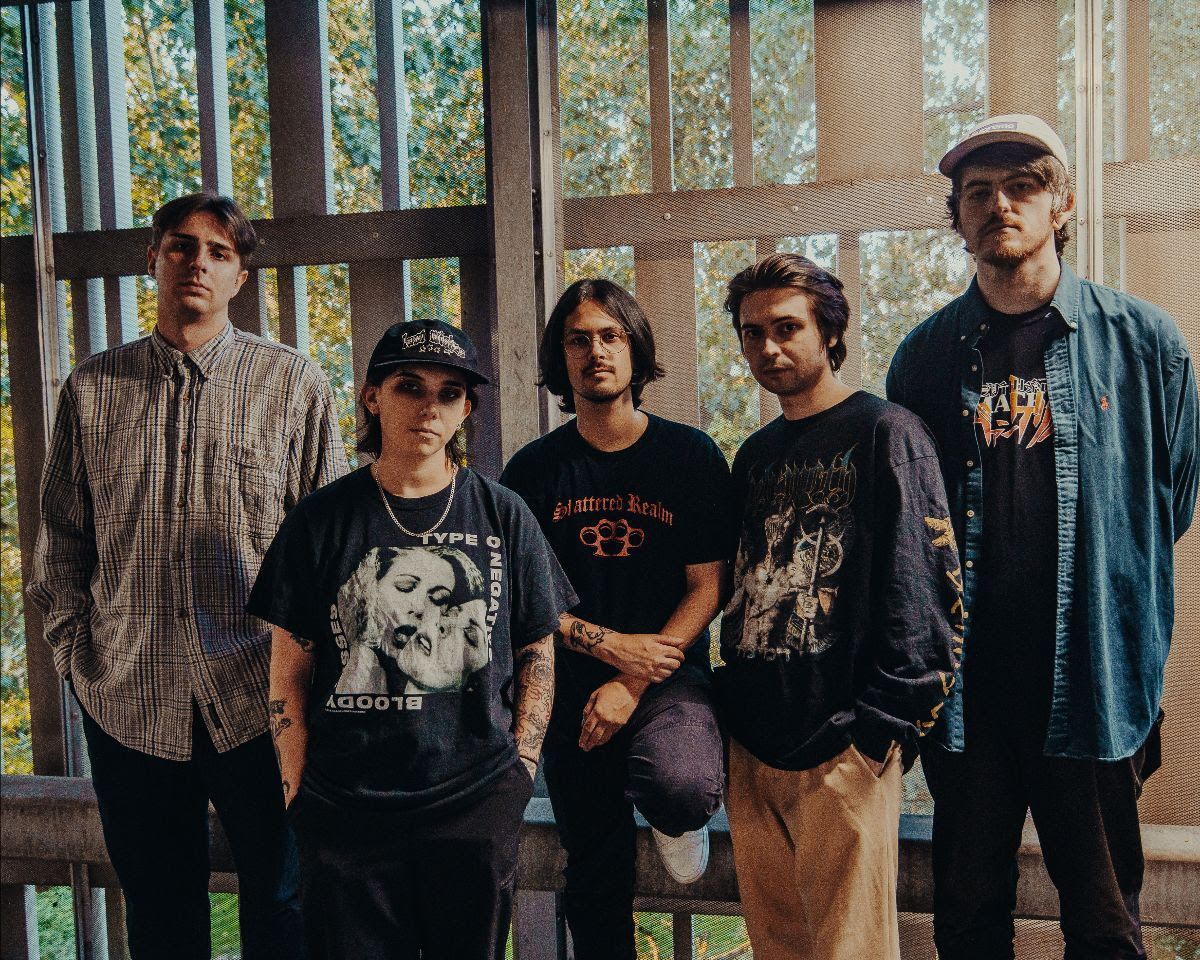
You’ve mentioned the challenges of writing catchy clean vocals that still feel authentic to Cauldron’s sound. How do you balance the melodic and the heavy in your music without compromising your core aesthetic?
Frazer: It’s surprised me seeing people describe the album as a new sound for us as I always felt like we were hinting towards this sound from the get go, and building towards it. It’s certainly difficult to maintain both parts of our sound without phoning in certain sections.
The main thing we try to do is write naturally. We write songs in a practice space with us actually playing through the song, rather than building it on a DAW. I think this helps us to feel where the song needs to go next as we can almost imagine how it would feel to play it live at a show.
If the song feels like it’s building to a chorus, we will play a chorus. If it feels like it’s making space for a breakdown, we will do that. In the past, we’ve struggled most when we’ve said “we need a breakdown” and tried to shoehorn it in, rather than come to it naturally.
Speaking of the DIY scene, how has the transition been from playing smaller, community-driven venues to now embarking on a much larger UK/EU tour? Are there aspects of those intimate shows you aim to preserve on the larger stage?
Frazer: We definitely still play smaller intimate shows much more than we do larger venues.
Our tour with Counterparts was the largest venues we’ve done, but since that tour we’ve not really played that many large spaces. The transition was strange at first though. I like to have almost no separation between us and the crowd as I feel it makes people more inclined to jump up and grab the mic etc.
It was definitely strange on that tour seeing people singing the lyrics but way in the back, but I guess you have to let people participate in their own way.
With your debut album ‘Suicide In The City’ dealing with heavy themes like anxiety and grief, what role do you think metalcore and, by extension, music in general, can play in mental health discourse and healing?
Frazer: The same role that just talking about mental health plays in itself. At my lowest, the two things that helped me most were escaping through this story but also returning to educate myself on what it actually was that was ruining my day to day life, which was my OCD.
I became an expert on OCD through watching countless hours of content where people with OCD talked about having OCD, and I realised I didn’t exist in a vacuum where what ailed me only ailed me. The same goes for music.
I grew up on music that was transparent and vulnerable about what the people writing the songs were going through, and it helped me to grow into someone that is perfectly comfortable with being honest and real about how I feel and who I am.
The character Tristram St. Claire and the group therapy session at the heart of your concept album — how much of this narrative is rooted in your personal experiences, and how much is fictional storytelling?
Frazer: 100% of the narrative is rooted in personal experience but it translates in a less overt way. I never attended a group therapy clinic in Seattle, but I did have countless months of therapy dealing with both great and horrible therapists.
All of the characters really represent parts of my own mental health that I was struggling to deal with, with John Doe being the character I wished I was – one with a blank slate to start fresh from. It’s confusing to just tell you about it but if I ever finish the book, you’ll see that the story is a mixture of the main story where the characters attend the group therapy clinic, and a short story of EC-135 the robot who keeps walking, both tie together in what I think is an interesting way and both are intrinsically linked with my own personal experiences.
There’s a stark contrast between the title ‘Suicide In The City’ and the message of hope that you mention is intertwined in the album. How do you navigate this duality in your songwriting and the album’s overarching narrative?
Frazer: The album is bleak and hopeless, there are small glimmers of light throughout the story but as the disclaimer states in Rejection Pact, there is no happy ending.
There is hope in the story, but the characters can’t ever access it. It’s out of reach. This tied in with my own personal life. There is hope in times of turmoil, you can take necessary steps to make yourself feel better, but sometimes it feels like the path is hidden away, whilst another path is much more obvious and easily accessible.
This other path is the path the characters of the story almost always take. It’s the path of false promises, escapism and disassociation. I was / still take that same path all the time, before I realise that it has no happy ending. That’s a long roundabout way of saying yeah the album has hope, but it’s buried beneath a lot of darkness.
Reflecting on your formative experiences, can you pinpoint a moment or a series of events that made the members of Cauldron realize that making music was more than a passion but a necessity?
Frazer: Speaking specifically for myself, I was bed ridden and suicidal and being taken care of by my parents. It was scary for me to even get into the shower because it would be 10 minutes of 0 distractions from my own thoughts.
When I started dreaming up the concept, it gave me a reason to open my laptop, which gave me a reason to get out of bed and go sit somewhere more creatively stimulating than my bedroom at my parents house, which then got me excited about creating, which in turn distracted me from myself. That’s where it became a necessity for me.
What bands or artists within the local Birmingham scene or beyond, perhaps discovered in 2023, have been pivotal in shaping your current musical direction?
Frazer: I’m not sure how many Birmingham bands have shaped our writing, but many have inspired us as a band and have helped foster a scene that we’re proud to exist within.
We started out playing a lot of shows with a band called Stranded which disbanded in 2019, but the members went onto play in other bands that were also great such as Graywave, xDeliverancex, Intent 2 Kill, and Phaze Two (which I also play in).
Our first shows were with Stranded and they took us out to the Glasgow hardcore scene which has always been our second home, with many great bands there that inspired us further like Revolve, Despize, Nothin’ But Enemies, Revulsion, etc.
Cruelty are another great band from Birmingham who we’ve played a lot with. Their most recent album ‘Salvation’ also came out this year on TCS and our guitarist Jess sings on one of the tracks.
Other than that, we’re mostly inspired as a band by others within the UKHC scene, as this scene showed us how to conduct ourselves and keep it correct. Most notably, bands like Cold Hard Truth, Knuckledust, Splitknuckle, Renounced, Mourning, Last Wishes and Raiden.
The European metalcore/metallic hardcore scene has its unique traits compared to other parts of the world. In what ways do you feel connected to or distinct from this scene?
Frazer: Narrowing it down a little further to UK metalcore and hardcore, there is a bluntness to our music that seems to come naturally to us which overall makes the music feel much more real. The best heavy music in my opinion is the music that may make sacrifices in terms of production in favour of creating something that feels authentic.
Given your experience and exploration in the genre, how do you perceive the evolution of metalcore in recent times, particularly with the integration of diverse musical elements and the shifting dynamics of live performances?
Zak: I think whenever a new band or record comes along in the genre people tend to refer to it as a “revival”, and while I do agree metalcore gets a fresh face every few years when an exciting new release comes along, I don’t think the genre ever really goes away. It is a very expansive genre which I think we try to draw from all corners of it in our music.
In my opinion the best metalcore is stuff that is clearly influence by the older early 2000s sound but also has its own spin. Our record came out on the same day as the Dying Wish album and the new Foreign Hands single, both great examples.
Could you shed some light on how your past experiences in other bands have informed the creation and journey of Cauldron? Are there any lessons from those days that you carry with you now?
Zak: We’ve all done a ton of bands separately and together before Cauldron, we’re very lucky now that we have finally found the line up of members that works perfectly.
Everyone is just as committed to getting things done as each other and we’ve all been in positions where we need to put the band before other commitments. It definitely helps that we are all best friends outside of the band as we understand each other very well.
We’ve had enough disagreements over the last 6 years of being a band that we know how to deal with them now and strive for the best outcome.
Collaboration appears to be a core aspect of your music creation process. How did working with producer Sam Bloor and masterer Grant Berry influence the final sound of ‘Suicide In The City’?
Zak: Sam Bloor is the final piece of the puzzle as far as everyone in the band is concerned. Our bassist Perry used to play drums in a band called Pinky who had recorded with Sam before, which is how we knew about Lower Lane.
We were looking at places to record our 2nd release ‘Shrine’, and I heard the drum sound and overall production quality from Sam and it was miles better than anything else that was accessible to us at the time, so we were instantly sold. ‘Suicide in the City’ is the 4th release we’ve done with Sam and every time we go back he just gets better and better which I think is nice to have a producer helps the band grow our sound from a recording point of view along with our writing getting better.
We always go into the studio with our songs 100% done to best of our ability which allows Sam to add his ideas for things we’d never think of. It also means we have more time to focus of laying down takes, which Sam is always able to get the best out of us.
This record is the first time we’ve had our music mastered by someone other than Sam. Grant came at Sams recommendation as he believed it was worth us putting that bit extra effort in with it being our first full length. Grant was awesome and worked very fast to elevate the sound of the album its its final form.
You’ve quickly gone from releasing singles to a full-blown album and now embarking on a tour. How has the acceleration affected the band’s internal dynamics and your personal lives?
Zak: It has been a very hectic time for us with putting the album out, we finished recording in January and after some set backs it felt like it was never going to be released. Then all of a sudden its November 2nd and wave of anxiety just hits us like “oh damn its out at midnight” which just didn’t feel real. I personally love it when we have a lot of things going on at once, as whenever we go through a quiet spell I can get very demotivated. The dynamic of the band is only strengthened when we have a busy schedule as everyone has aspects of the band outside of the music that they look after so the workload is shared evenly. As for personal lives, speaking only for myself, I actually walked out of my job the day before our last tour because it just didn’t matter to me.
When the album concept came to life during a particularly rough patch, how did you as a band support each other through the creative process while dealing with such intense subject matter?
Zak: Frazer and I lived together for a large majority of the pandemic. We started writing the album just before covid hit and had plans to move in together and get the album finished really quickly. As Frazer mentioned before we like to write in our lockup and covid meant we couldn’t do that.
Frazer and I were also at uni during this time and we had Dec join the band during covid. This coupled with general lack of motivation for anything musical on my part during covid meant the album took a lot longer to finish than we had intended. I was not able to play drums for most of the pandemic which left me pretty miserable, Frazer would frequently nag me to get songs written and demo’d and at times even had to bribe me to get me to do it as I was just so unmotivated.
In hindsight I wish I had been more active during this time as we all needed something to keep ourselves occupied, and who knows maybe the album would have come out a year ago.
With your album having a limited edition physical release that sold out swiftly, how do you see the role of physical media in an increasingly digital age, especially within the hardcore scene?
Zak: Every single release we have put out has had a physical release to go alongside it, whether that’s tapes, CDs or vinyl.
For this record a lot of the items that came with it were actually TCS’s idea as he was really committed to making this release the biggest one yet from ourselves and the label. He’s always thinking up new ideas for exclusive variants and interesting merch items etc.
Ephyra were also great in getting some awesome merch together and finally giving me what I’ve always wanted (a plain black Cauldron record). So for as long as we work with labels that are this passionate about their releases we are going to continue to make cool stuff.
The notion of legacy seems important in any artist’s journey. With your debut album out now, what is the legacy you hope to begin with ‘Suicide In The City’?
This album came from Birmingham.



